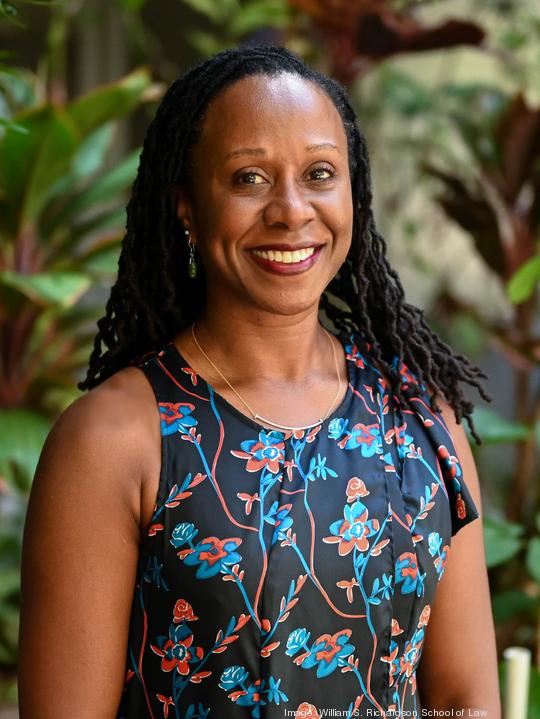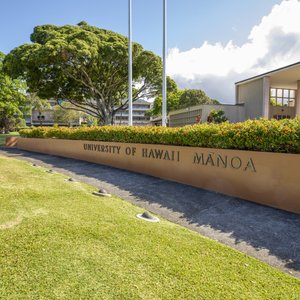
As the dean of the William S. Richardson School of Law at the University of Hawaii at Manoa, Camille Nelson said she is currently focused on “prioritizing excellence in core areas necessary for practice readiness.”
This includes what she called “strategic hiring,” and she said the law school has recently hired new faculty who specialize in areas such as property law, civil procedure, contracts, environmental law, human and civil rights, and more.
In addition to addressing foundational needs, Nelson said another priority for the school this year — which marks its 50th anniversary — is helping to create new career opportunities for students.
“We want them to be included in opportunities in areas like fintech, cryptocurrency, regional and national security, artificial intelligence, cyber security, the evolution of employment law and health law post-pandemic, e-discovery, and data and social analytics,” Nelson said in an email to Pacific Business News.
The school made a significant stride in providing the resources necessary to create such opportunities last September, when UH alumnus Jay Shidler donated $1 million to start the Dean’s Innovation Fund, which Nelson said will allow her “to bring into legal education the type of innovative approach that drives business.”
“There are few novel areas unaffected by the law. Many law schools have funding and resourcing support that allows for the pursuit of innovative exploration and ventures in emerging areas. We now have this ability as well,” Nelson said.
“I am delighted that [Shidler] has chosen to support the law school in such a visionary way that signs his belief in our ability to innovate,” she added. “The nature of the gift is itself innovative and I think it bodes well for the law school as we enter our 50th anniversary year and prepare for the next 50 years.”
Nelson recently shared more information about the Dean’s Innovation Fund with PBN.
What will the fund allow you to do? The Dean's Innovation Fund allows the dean to be intentional and strategic in supporting new and emerging ideas that would not otherwise be covered by the operational budget. It also incentivizes and encourages faculty to explore bold new ideas. I am particularly excited by initiatives that supplement and enhance our existing strengths and allow us to bridge more intentionally to external community energy and expertise.
What will some of the new initiatives entail? The first initiative that I can share is our Innovator in Residence. I’ve been able to recruit a tremendous legal technologist who worked with the Harvard Access to Justice Lab. Matt Stubenberg is a lawyer who has already made an impact at Richardson Law. I asked him to teach our first Coding for Lawyers class. Now Matt will have more time and capacity to take on advanced projects and engage our students with opportunities similar to those he provided in New England.
Our students and other community members will benefit greatly from his data-driven approach to collaboration that furthers justice. We have already been in conversation with several external stakeholders about the exciting possibilities.
In a previous interview with PBN, you said the fund will help the law school "lean into the future more." How have the needs of students and the law school changed, or how are they changing? This fund is key to our ability to responsively engage evolving areas of legal practice, as well as the changing dictates of practice. Essentially, the fund allows the dean unrestricted funds to respond to ideas and demands as they arise, and to invest in key areas of opportunity that we otherwise would not have the bandwidth to support.
As an example, last year Hawaii become the latest state to adopt the duty of technology competence for lawyers. Specifically, several amendments to Hawaii's Rules of Professional Conduct went into effect including revisions to the rule which requires that a lawyer provide competent representation to clients. … This rule now imbeds an expectation of tech savvy. As one of the comments to this rule elaborates, “[t]o maintain the requisite knowledge and skill, a lawyer should engage in continuing study and education and keep abreast of changes in the law and its practice, including the benefits and risks associated with relevant technology.”
In this vein, it was Jay’s gift that allowed me to support the attendance of one of our fantastic students at … The Association of American Law Schools conference [that] took place in San Diego this month. … That one of our students presented on a panel focused on “The Transformative Power of Humanistic and Holistic Legal Knowledge” is impressive and is the type of opportunity that we want to create for our students to supplement their legal education and professional development.
Philanthropy support gives us the capacity to continue to support these impactful opportunities for our students. I think Richardson Law students have much to contribute to these national and international conversations.



